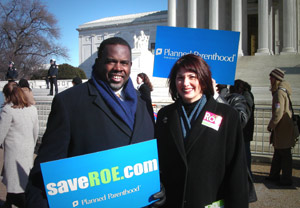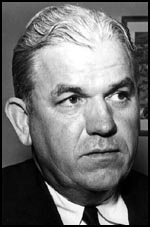Roe v. Wade, 410 U.S. 113 (1973), was a landmark decision of the U.S. Supreme Court in which the Court ruled that the Constitution of the United States generally protected a right to have an abortion. The decision struck down many abortion laws, and caused an ongoing abortion debate in the United States about whether, or to what extent, abortion should be legal, who should decide the legality of abortion, and what the role of moral and religious views in the political sphere should be. The decision also shaped debate concerning which methods the Supreme Court should use in constitutional adjudication.

Norma Leah Nelson McCorvey, also known by the pseudonym "Jane Roe", was the plaintiff in the landmark American legal case Roe v. Wade in which the U.S. Supreme Court ruled in 1973 that individual state laws banning abortion were unconstitutional.
Planned Parenthood v. Casey, 505 U.S. 833 (1992), was a landmark decision of the Supreme Court of the United States in which the Court upheld the right to have an abortion as established by the "essential holding" of Roe v. Wade (1973) and issued as its "key judgment" the restoration of the undue burden standard when evaluating state-imposed restrictions on that right. Both the essential holding of Roe and the key judgment of Casey were overturned by the Supreme Court in 2022, with its landmark decision in Dobbs v. Jackson Women's Health Organization.

The United States abortion-rights movement is a sociopolitical movement in the United States supporting the view that a woman should have the legal right to an elective abortion, meaning the right to terminate her pregnancy, and is part of a broader global abortion-rights movement. The movement consists of a variety of organizations, with no single centralized decision-making body.
Lawrence v. Texas, 539 U.S. 558 (2003), is a landmark decision of the U.S. Supreme Court in which the Court ruled that sanctions including any form of criminal punishment to all forms of private, consensual non-procreative adult sexual activities between two individuals are unconstitutional. The Court reaffirmed the concept of a "right to privacy" that earlier cases had found the U.S. Constitution provides, even though it is not explicitly enumerated. It based its ruling on the notions of personal autonomy to define one's own relationships and of American traditions of non-interference with any or all forms of private sexual activities between consenting adults.

Harry Andrew Blackmun was an American lawyer and jurist who served as an associate justice of the Supreme Court of the United States from 1970 to 1994. Appointed by President Richard Nixon, Blackmun ultimately became one of the most liberal justices on the Court. He is best known as the author of the Court's opinion in Roe v. Wade.

Henry Menasco Wade was an American lawyer who served as district attorney of Dallas County from 1951 to 1987. He participated in two notable U.S. court cases of the 20th century: the prosecution of Jack Ruby for killing Lee Harvey Oswald, and the U.S. Supreme Court case that held abortion was a constitutional right, Roe v. Wade. In addition, Wade was district attorney when Randall Dale Adams, the subject of the 1988 documentary film The Thin Blue Line, was wrongfully convicted in the murder of Robert Wood, a Dallas police officer.
Webster v. Reproductive Health Services, 492 U.S. 490 (1989), was a United States Supreme Court decision on upholding a Missouri law that imposed restrictions on the use of state funds, facilities, and employees in performing, assisting with, or counseling an abortion. The Supreme Court in Webster allowed for states to legislate in an aspect that had previously been thought to be forbidden under Roe v. Wade (1973).

Sarah Catherine Ragle Weddington was an American attorney, law professor, advocate for women's rights and reproductive health, and member of the Texas House of Representatives. She was best known for representing "Jane Roe" in the landmark Roe v. Wade case before the United States Supreme Court. She also was the first female General Counsel for the US Department of Agriculture.
Doe v. Bolton, 410 U.S. 179 (1973), was a decision of the Supreme Court of the United States overturning the abortion law of Georgia. The Supreme Court's decision was released on January 22, 1973, the same day as the decision in the better-known case of Roe v. Wade.
Hodgson v. Minnesota, 497 U.S. 417 (1990), was a United States Supreme Court abortion rights case that dealt with whether a state law may require notification of both parents before a minor can obtain an abortion. The law in question provided a judicial alternative.
Gonzales v. Carhart, 550 U.S. 124 (2007), was a landmark decision of the U.S. Supreme Court that upheld the Partial-Birth Abortion Ban Act of 2003. The case reached the high court after U.S. Attorney General, Alberto Gonzales, appealed a ruling of the U.S. Court of Appeals for the Eighth Circuit in favor of LeRoy Carhart that struck down the Act. Also before the Supreme Court was the consolidated appeal of Gonzales v. Planned Parenthood from the U.S. Court of Appeals for the Ninth Circuit, whose ruling had the same effect as that of the Eighth Circuit.

Linda Nellene Coffee is an American lawyer living in Dallas, Texas. Coffee is best known, along with Sarah Weddington, for arguing the precedent-setting United States Supreme Court case Roe v. Wade.
Bellotti v. Baird, 443 U.S. 622 (1979), is a United States Supreme Court case that ruled 8-1 that teenagers do not have to secure parental consent to obtain an abortion.
United States v. Vuitch, 402 U.S. 62 (1971), was a United States Supreme Court abortion rights case, which held that the District of Columbia's abortion law banning the practice except when necessary for the health or life of the woman was not unconstitutionally vague.
Bigelow v. Virginia, 421 U.S. 809 (1975), was a United States Supreme Court decision that established First Amendment protection for commercial speech. The ruling is an important precedent on challenges to government regulation of advertising, determining that such publications qualify as speech under the First Amendment.
Whole Woman's Health v. Hellerstedt, 579 U.S. 582 (2016), was a landmark decision of the US Supreme Court announced on June 27, 2016. The Court ruled 5–3 that Texas cannot place restrictions on the delivery of abortion services that create an undue burden for women seeking an abortion. On June 28, 2016, the Supreme Court refused to hear challenges from Wisconsin and Mississippi where federal appeals courts had enjoined the enforcement of similar laws.
Jonathan Franklin Mitchell is an American lawyer, academic, and legal theorist who served as the Solicitor General of Texas from 2010 to 2015. He has argued seven cases before the Supreme Court of the United States. Mitchell has served on the faculties of Stanford Law School, the University of Texas School of Law, the George Mason University School of Law, and the University of Chicago Law School. In 2018, he opened a private solo legal practice in Austin, Texas.
June Medical Services, LLC v. Russo, 591 U.S. ___ (2020), was a United States Supreme Court case in which the Court ruled that a Louisiana state law placing hospital-admission requirements on abortion clinics doctors was unconstitutional. The law mirrored a Texas state law that the Court found unconstitutional in 2016 in Whole Woman's Health v. Hellerstedt (WWH).
Dobbs v. Jackson Women's Health Organization, No. 19-1392, 597 U.S. 215 (2022), is a landmark decision of the U.S. Supreme Court in which the court held that the Constitution of the United States does not confer a right to abortion. The court's decision overruled both Roe v. Wade (1973) and Planned Parenthood v. Casey (1992), returning to individual states the power to regulate any aspect of abortion not protected by federal statutory law.







